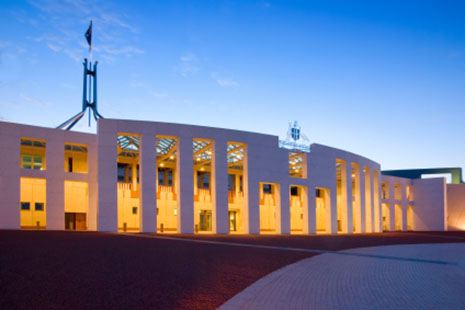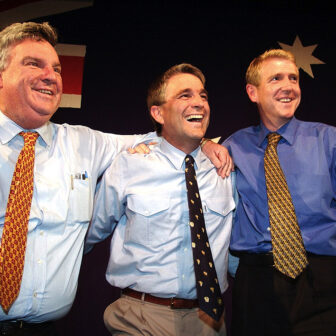PETER COSTELLO’s foreshadowed exit from politics brings to an end what must be the most protracted sulk in Australian politics. Yet already the myth-makers are adorning him with the mantle of “best prime minister we never had.” The reality, along with that of Bert Evatt and Alexander Downer, is quite the opposite.
It is doubtful whether Costello was ever a serious contender to challenge John Howard in government. Unlike Paul Keating in Bob Hawke’s Labor government, Costello never enjoyed a significant support base within his own party. At the peak of his popularity in the latter Howard years, he could have counted on no than 27 votes, at best, out of a party room of more than a hundred.
And it was never just a lack of numerical support within Liberal ranks that forced Costello to sit on his hands; it was also a lack of real quality support. A quick glance at those who identified as Costello campers always made the Howard majority smile: they were in the main the duds, the malcontents, the disappointed, the rejects. Very few of them could have been classified as enthusiastically pro-Costello; it was far more a case of being anti-Howard.
Howard knew this and taunted Costello remorselessly. When Howard posed as the loyal and faithful servant of the Liberal Party by vowing to serve as long as the party wanted him, this was pure confected humility that served only to throw sand in Costello’s face and demonstrate to the party how powerless he really was. What Howard was boasting in this oft-repeated mantra was that he had the numbers, and his rival did not.
Costello might have won some solid support had he been more assertive, but in the run of things Howard simply played him off a break – and the party knew it. A more ruthless operator, such as Robert Menzies, would have contrived a resignation on a matter of high principle and confronted the leader from high moral ground, just as Menzies did under Joseph Lyons in 1938 after Lyons abandoned a national insurance scheme. Menzies, of course, went on to prosper politically after a stumble or two, but his confected resignation did nothing to hurt his prospects (and, indeed, brought the prize even closer by adding to the mounting stresses that killed Lyons early in 1939).
On another front, Costello has to be seen as culpable in his role in securing the leadership of Downer, whom he served as deputy before the latter was humiliated into standing down in favour of a recycled Howard in 1995. Costello must have known of Downer’s limitations. If so, why did he support him? If he did not know, then what sort of a judge of character was he?
Again, the annals of Liberal Party history show that Costello was not the first contender for leadership who supported a dud along the way. Back in the 1950s an ambitious NSW Liberal called Bob Askin saw his party chafing and divided in opposition, with two equal camps pushing for dominance. He decided to provide the circuit-breaker, arranging for his old commanding officer, Murray Robson, a socialite solicitor, to emerge as an acceptable compromise. Robson never cut it, as Askin must have known, but the brief interlude of Robson’s leadership bought Askin time to build the numbers to eventually have a crack at Robson’s successor. Costello appeared to have no such strategy.
Was Costello ever really representative of an alternative face to the Liberal Party? Certainly, he was a republican where Howard was an ardent monarchist, and he made favourable noises about reconciliation with Indigenous Australians in contrast to Howard’s silence. And he was younger. But there is little difference in substance, and if looked at from the perspectives of policy and ideology, Costello was far more gung-ho about the issue that was causing Howard so much grief in the electorate – industrial relations. Howard, for all his bluster, was a pragmatist, but Costello, a foundation member of the radical right H.R. Nicholls Society, was an ideologue. This was never any alternative for the Liberals; indeed, it might be argued that a switch to Costello would have dug them ever deeper into the hole Howard had made.
Politicians always say they pay scant attention to opinion polls, which is really like a clergyman dismissing the bible. Politicians sniff the wind like a stockbroker sniffs the gossip at an insider trader’s cocktail party: it is their lifeblood. Howard knew, and the Liberal Party knew, that Costello had a big resistance factor out there in voter land. And it wasn’t hard to fathom why. Costello could not connect, and the voters knew it.
A prime example was a few years ago when the perennial question of rising petrol prices was raised with the then Treasurer on a talkback radio show. Why not do as I do, he told a hapless caller, fill up on Tuesdays when the prices are always lower? Had Costello forgotten (or perhaps he never knew) that for many workers, pay day – Thursday – is the only day they are cashed up? And that’s when the prices go up.
Finally, what sort of a treasurer was he? Only a complete curmudgeon would argue that he was not competent; he was. But these were boom times and the economic sunshine was in abundance; even Bill Hayden’s old drover’s dog could have made a fair fist of it. Wayne Swan, to be sure, has a far harder job. If Costello’s policy legacy is the GST, he will be remembered as the most regressive treasurer yet, shifting the tax burden from the wealthy to the rest.
Within the Liberal Party, there are those who will not forgive Costello for his post-election sulk, leaving the party to flounder in the unfamiliar waters of opposition while he retired to the easy life of the backbench. In any case, his decision to finally leave the stage might not have been his alone. His continued presence, and the speculation that provoked, was always going to hamper Malcolm Turnbull’s leadership. Did the Victorian party president, David Kemp, a party man through and through, have a quiet word, as party presidents are supposed to do?
If so, there is historical irony at work. Both Costello and Kemp entered parliament in 1990 as beneficiaries of a former pro-active party president in Victoria, Michael Kroger, who was intent on reinvigorating a moribund party. When the quiet words failed, Kroger went for the scalpel. Costello, at least, knew his time was up. •




